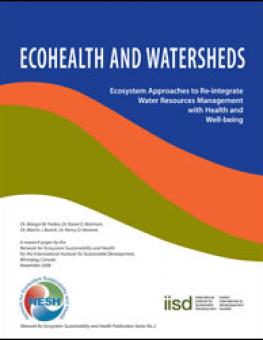
Ecohealth and Watersheds: Ecosystem Approaches to Re-integrate Water Resources Management with Health and Well-being
Our health and well-being are linked to the watersheds in which we live, but our experience with managing watersheds for health is limited. This publication presents a new field of research, policy and practice that is addressing this need by focusing on watersheds as settings to integrate ecosystem management and public health.The reader is introduced to a range of international innovations—including two complementary approaches to health and the environment: ecohealth, which argues that human health and well-being are not only dependent on ecosystems but are also important outcomes of effective ecosystem management; and watershed-based integrated water resources management (IWRM), which is based on the premise that watersheds are appropriate units for managing social-ecological systems.
The benefits of IWRM for health, social equity and social-ecological resilience are examined, emphasizing the potential role of well-managed watershed systems as buffers against environmental hazards and disasters, as well as new-generation settings for governance, social learning and human well-being. The paper highlights the need for integrated frameworks and governance—especially those that can speak to the converging agendas of public health, development and water resources management communities. Key issues are described, laying the foundations for future research, policy and outreach.
A stand-alone Executive Summary (PDF - 120 kb) in English, Spanish and French is also available.
You might also be interested in
December 2024 | Carbon Minefields Oil and Gas Exploration Monitor
In November 2024, 23 oil and gas exploration licences were awarded across five countries, with Russia granting the licences that account for the largest portion of embodied emissions.
Toward a Coherent, Transformative Approach to Financing Sustainable Development, Climate, and Nature
Four key proposals for the Fourth Financing for Development Conference (FfD4) to create an integrated, equitable approach to financing climate, nature, and development goals.
Green Public Procurement in India
This report analyzes the status of green public procurement (GPP) in India and suggests key strategies for advancing sustainable procurement practices.
Sustainable Asset Valuation (SAVi) of a Small-Scale Tree Planting Initiative in Côte d'Ivoire
This report analyzes the social, economic, and environmental outcomes of a small-scale tree planting initiative at schools in Côte d'Ivoire.